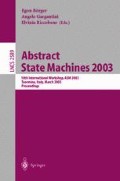Abstract
Mobile UNITY refers to a notation system and proof logic initially designed to accommodate the special needs of the emerging field of mobile computing. The model allows one to define units of computation and mobility and the formal rules for coordination among them in a highly decoupled manner. In this paper, we reexamine the expressive power of the Mobile UNITY coordination constructs from a new perspective rooted in the notion that disciplined usage of a powerful formal model must rely on formally defined schemas. Several coordination schemas are introduced and formalized. They examine the relationship between Mobile UNITY and other computing models and illustrate the mechanics of employing Mobile UNITY as the basis for a formal semantic characterization of coordination models.
Access this chapter
Tax calculation will be finalised at checkout
Purchases are for personal use only
Preview
Unable to display preview. Download preview PDF.
References
R. J.R. Back and K. Sere. Stepwise refinement of parallel algorithms. Science of Computer Programming, 13(2–3):133–180, 1990. 128
G. Cabri, L. Leonardi, and F. Zambonelli. MARS: A programmable coordination architecture for mobile agents. IEEE Internet Computing, 4(4):26–35, 2000. 127, 138
L. Cardelli and A. Gordon. Mobile ambients. Theoretical Computer Science, Special Issue on Coordination, 240(1):177–213, June 2000. 127, 143
K.M. Chandy and J. Misra. Parallel Program Design: A Foundation. Addison-Wesley, New York, NY, 1988. 126, 134
N. Davies, S. Wade, A. Friday, and G. Blair. Limbo: A tuple space based platform for adaptive mobile applications. In Proceedings of the International Conference on Open Distributed Processing/Distributed Platforms (ICODP/ICDP’ 97), pages 291–302, May 1997. 138
D. Gelernter. Generative communication in Linda. ACM Computing Surveys, 7(1):80–112, Jan. 1985. 138
R. Gray, D. Kotz, G. Cybenko, and D. Rus. D’agents: Security in a multiplelanguage, mobile agent system. In G. Vigna, editor, Mobile Agents and Security, volume 1419 of Lecture Notes in Computer Science, pages 154–187. 1998. 127, 138
C.A.R. Hoare. Communicating Sequential Processes. Prentice Hall, 1985. 147
C. Mascolo. MobiS: A specification language for mobile systems. In Proceedings of 3rd Int. Conf. on Coordination Models and Languages, volume 1594, pages 37–52. Springer-Verlag, 1999. 143
C. Mascolo, G. P. Picco, and G.-C. Roman. A fine-grained model for code mobility. In Proceedings of the Seveth European Software Engineering Conference ESEC, volume 1687 of Lecture Notes in Computer Science, pages 39–56. Springer-Verlag, September 1999. 143
P. J. McCann and G.-C. Roman. Compositional programming abstractions for mobile computing. IEEE Transactions on Software Engineering, 24(2):97–110, 1998. 126, 127, 128, 134
P. J. McCann and G.-C. Roman. Modeling Mobile IP in Mobile UNITY. ACM Transactions on Software Engineering and Methodology, 8(2):115–146, April 1999. 127
R. Milner. Communication and Concurrency. Prentice Hall, London, 1989. 147
R. Milner, J. Parrow, and D. Walker. A calculus of mobile processes, parts I and II. Information and Computation, 100(1):1–77, 1992. 127, 147
A.L. Murphy. Enabling the Rapid Development of Dependable Applications in the Mobile Environment. PhD thesis, Washington University in St. Louis, August 2000. 143
A.L. Murphy, G.P Picco, and G.-C. Roman. Lime: A middleware for physical and logical mobility. In Proceedings of the 21st International Conference on Distributed Systems, pages 524–533. IEEE Computer Society Press, April 2001. 127, 142
A. Omicini and F. Zambonelli. The TuCSoN coordination model for mobile information agents. In Proceedings of the 1st Workshop on Innovative Internet Information Systems, June 1998. 138
G.P. Picco, G.-C. Roman, and P. J. McCann. Reasoning about code mobility in Mobile UNITY. ACM Transactions on Software Engineering and Methodology, 10(3):338–395, 2001. 127
G.-C. Roman and P. J. McCann. A notation and logic for mobile computing. Formal Methods in System Design, 20:47–68, 2002. 126, 127, 128
Author information
Authors and Affiliations
Editor information
Editors and Affiliations
Rights and permissions
Copyright information
© 2003 Springer-Verlag Berlin Heidelberg
About this paper
Cite this paper
Roman, GC., Payton, J. (2003). Mobile UNITY Schemas for Agent Coordination. In: Börger, E., Gargantini, A., Riccobene, E. (eds) Abstract State Machines 2003. ASM 2003. Lecture Notes in Computer Science, vol 2589. Springer, Berlin, Heidelberg. https://doi.org/10.1007/3-540-36498-6_7
Download citation
DOI: https://doi.org/10.1007/3-540-36498-6_7
Published:
Publisher Name: Springer, Berlin, Heidelberg
Print ISBN: 978-3-540-00624-4
Online ISBN: 978-3-540-36498-6
eBook Packages: Springer Book Archive

